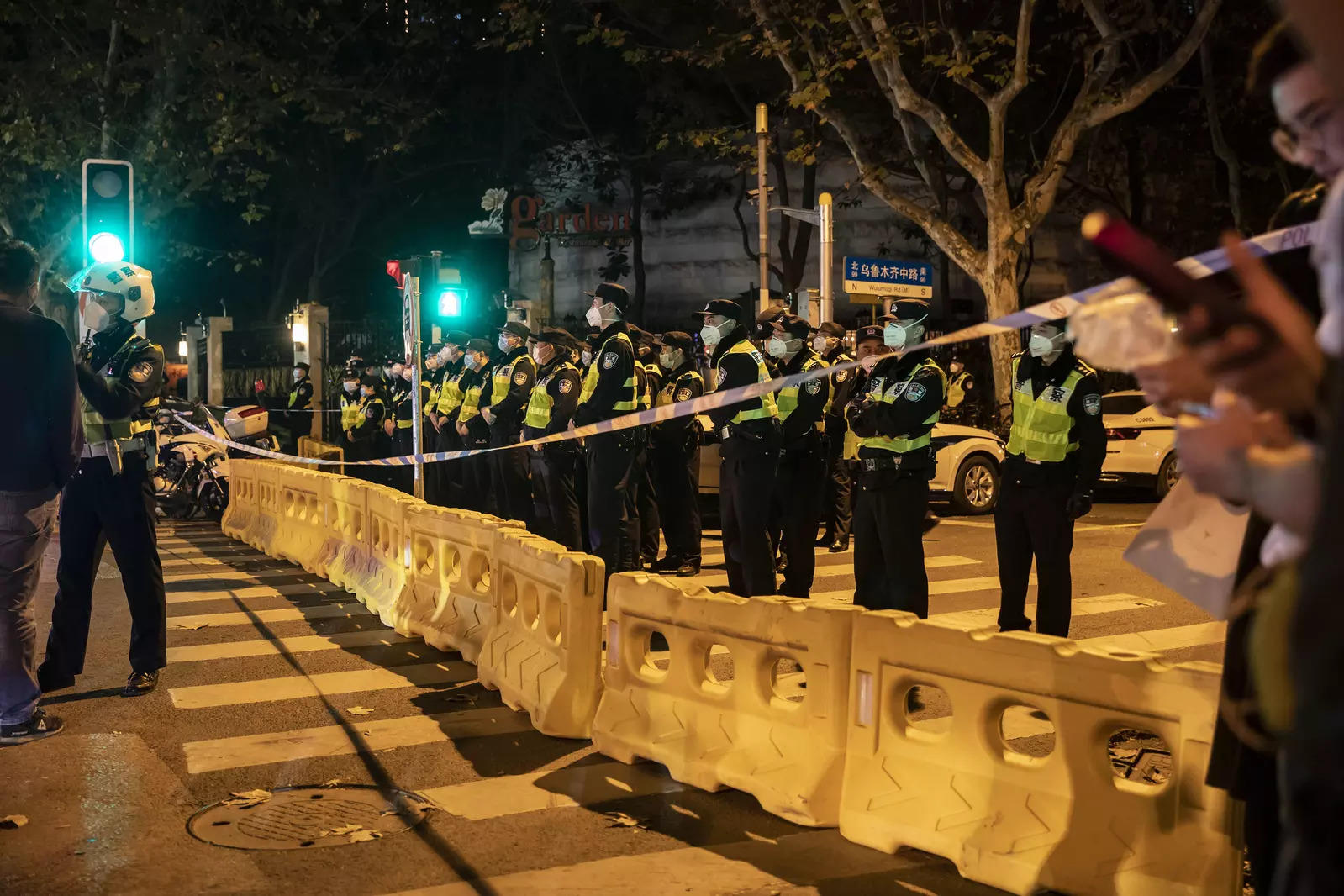
NEW DELHI: When it comes to silencing dissent, the Chinese police have all the tools required in their arsenal.
From using facial recognition software to pulling out location data to track down and detain protesters, the police are working 24x7 to ensure the security of their regime.
In fact, the government has been preparing for such challenges for decades, installing the machinery needed to quash large-scale upheavals.
After an initially muted response to the widespread protests against the strict Covid zero measures, the security personnel are now going full swing to stamp out demonstrations.
Security personnel are using pepper spray and tear gas, police and paramilitary troops flooded city streets with jeeps, vans and armored cars in a massive show of force.
The officers fanned out, checking IDs and searching cellphones for photos, messages or banned apps that might show involvement in or even just sympathy for the protests.
Phone data & facial recognition
The police apparently relied on phone data, surveillance footage and facial recognition to hunt for protesters and detain them.
Beijing police used phone location data either captured from on-site scanners or Covid health codes scanned by people taking taxis to areas where protests took place, a Zhengzhou-based lawyer said.
"Many callers from Beijing were confused as to why they were contacted by police when they genuinely just walked past the protest site and didn't take part," she added.
"We have no idea how exactly they did this."
Encrypted protesters' chat groups — only accessible in China with illegal VPN software — are on high alert for police infiltrators as news spreads of further arrests and intimidation.
Participants have been urging each other to wipe all evidence of the protests — including chat histories, videos and photos — from their phones in anticipation of police checks.
A well-prepared machinery
After the Tiananmen crackdown, the ruling Chinese Communist Party invested in the means to deal with unrest without resorting immediately to using deadly force.
During a wave of dissent by unemployed workers in the late 1990s and early 2000s, the authorities tested that approach, focusing on preventing organizers in different cities from linking up and arresting the leaders while letting rank-and-file protesters go largely untouched.
At times, they've been caught by surprise. In 1999, members of the Falun Gong meditation sect, whose membership came to rival the party's in size, surrounded the leadership compound in Beijing in a show of defiance that then-leader Jiang Zemin took as a personal affront.
A harsh crackdown followed. Leaders were given heavy prison sentences and members were subject to harassment and sometimes sent to re-education centers.
The government responded with overwhelming force in 2008, when anti-government riots broke out in Tibet’s capital Lhasa and unrest swept through Tibetan regions in western China, authorities responded with overwhelming force.
The next year, a police crackdown on protests by members of the Uyghur Muslim minority in the capital of the northwestern Xinjiang region, Urumqi, led to bloody clashes in which at least 197 were killed, mostly Han Chinese civilians.
In both cases, forces fired into crowds, searched door-to-door and seized an unknown number of suspects who were either sentenced to heavy terms or simply not heard from again. Millions of people were interned in camps, placed under surveillance and forbidden from traveling.
China has been able to muster such resources thanks to a massive internal security budget that reportedly has tripled over the past decade, surpassing that for national defence. Xinjiang alone saw a ten-fold increase in domestic security spending during the early 2000s, according to Western estimates.
Monitoring online dissent
There's a less visible but equally intimidating, sprawling system in place to monitor online content for anti-government messages, unapproved news and images. Government censors work furiously to erase such items, while propaganda teams flood the net with pro-party messages.
Behind the repression is a legal system tailor-made to serve the one-party state. China is a nation ruled by law rather than governed by the rule of law. Laws are sufficiently malleable to put anyone targeted by the authorities behind bars on any number of vague charges.
Those range from simply "spreading rumors online," tracked through postings on social media, to the all-encompassing "picking quarrels and provoking trouble," punishable by up to five years in prison.
Charges of "subverting state power" or "incitement to subvert state power" are often used, requiring little proof other than evidence the accused expressed a critical attitude toward the party-state. Those accused are usually denied the right to hire their own lawyers. Cases can take years to come to trial and almost always result in convictions.
In a further disincentive to rebel, people released from prison often face years of monitoring and harassment that can ruin careers and destroy families.
The massive spending and sprawling internal security network leaves China well prepared to crackdown on dissent. It also suggests "China’s internal situation is far less stable than the leadership would like the world to believe," China politics expert Dean Cheng of the Heritage Foundation wrote on the Washington, DC-based conservative think tank's website.
It's unclear how sustainable it is, he said. "This could have the effect of either changing Chinese priorities or creating greater tensions among them."
Mass arrests
The Chinese state force is so well equipped that it has the ability to round up scores of people on the mere suspicion of threat.
This was apparent during the all-important Communist Party Congress held in October.
The police built a virtual fortress around the capital city Beijing, where the meeting was being held.
In just three months, the authorities arrested more than 1.4 million criminal suspects nationwide to create a "safe and stable political and social environment" for the CPC.
Similar large-scale detentions are taking place now as anti-government protests flare up across cities.
(With inputs from AP, AFP)







